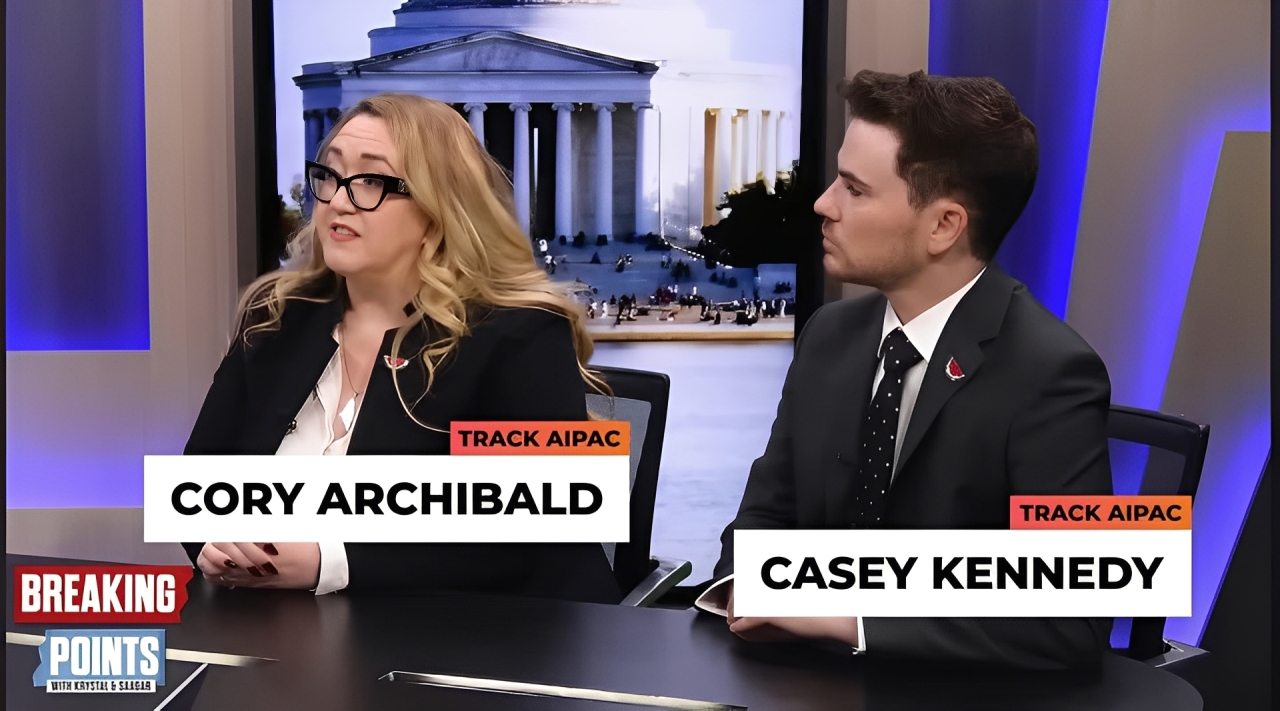
Elham Asaad Buaras
The founders of a popular X account that tracks pro-Israel lobby funding in US politics have revealed their identities following a coordinated harassment and doxing campaign, a development that comes amid rising political tension over Washington’s stance on Israel.
Casey Kennedy and Cory Archibald, co-founders of the transparency initiative @TrackAIPAC, said they decided to go public during an interview on Breaking Points, the independent online news programme on November 11 after their personal information began circulating online. They allege the American Israel Public Affairs Committee (AIPAC) attempted to discredit their work before anonymous accounts published their private details.
For weeks AIPAC friendly trolls have been sending threatening messages and trying to dox our team members. Well if they want to find us so badly, here we are.
— AIPAC Tracker (@TrackAIPAC) November 11, 2025
Our first public interview just dropped on Breaking Points with @krystalball and @esaagar: https://t.co/QgmUr6M8Vm
“They were tagging us, replying to our posts, quoting us, trying to invalidate our data,” Kennedy said. “It was very obviously organised.”
Their disclosure coincides with a broader shift in US politics. For decades, AIPAC enjoyed strong bipartisan support, shaping congressional attitudes toward Israel and helping secure billions in military aid. Yet criticism has grown—even from within Congress.
Former Congressman Brian Baird, who said he “had admired Israel since [he] was a kid” but became increasingly disillusioned, argued that when key votes occur, the question is often not what is right for the US, but “How is AIPAC going to score this?”
He pointed to a 2009 House resolution condemning the Goldstone Report, a UN investigation into the 2008–09 Gaza War documenting alleged war crimes by both Israel and Hamas. Baird was one of the few to oppose the resolution, recalling: “We have member after member coming to the floor to vote on a resolution they’ve never read, about a report they’ve never seen, in a place they’ve never been.”
The Goldstone Report concluded that Israel’s operations in Gaza caused extensive civilian casualties and destruction, while also criticising Hamas’s rocket attacks. Israel rejected the report as biased, and Congress, under heavy pressure from AIPAC, voted overwhelmingly to denounce it.
Baird warned that uncritical alignment with Israeli policy undermines both Israel’s long-term security and its moral integrity, arguing that many supporters are “backing policies” such as the killing of civilians that are “ultimately, destructive for the country.”

Support for AIPAC is now showing signs of strain, particularly among younger and progressive Democrats as Israel’s Gaza offensive continues. Even moderates are distancing themselves. Representative Seth Moulton, previously considered reliably pro-Israel, recently rejected AIPAC’s endorsement, saying he remained a “friend of Israel, but not of its current government.”
The shift is increasingly visible on Capitol Hill. Representative Hakeem Jeffries, the House Democratic minority leader, recently accepted an endorsement from J Street, a centre-left lobby advocating a two-state solution, a rare break from AIPAC’s line.
Democratic attendance at AIPAC’s annual Israel trip has plunged, and some lawmakers are refusing its campaign donations. Legislation opposed by AIPAC, including proposals to restrict weapons sales to Israel, is gaining Democratic support.
Public opinion is moving as well. A Data for Progress survey found nearly a third of voters in New York’s 15th congressional district view AIPAC unfavourably, while CNN exit polling showed almost half of voters backing democratic socialist Zohran Mamdani were influenced by his criticism of Israel’s actions in Gaza.
In New York, the issue is reshaping campaigns: former state legislator Michael Blake, once an AIPAC supporter, is challenging Congressman Ritchie Torres, accusing him of prioritising the lobby over local issues such as housing.
For @TrackAIPAC, now operating as Citizens Against AIPAC Corruption, the changing climate has increased interest in their work. The group analyses campaign finance records to highlight financial ties between US politicians and the lobby. “The reason our officials keep towing this line is because they’re in the pocket of foreign interests who pressure them to do so,” Archibald said. “Our goal is to make working with AIPAC a political liability.”
The initiative has amassed almost 400,000 followers, drawing increasing attention in Washington. But its visibility has come at a cost. “Transparency is the one thing they can’t control,” Kennedy said. “If voters start seeing who really funds their representatives, AIPAC’s grip starts to slip.” AIPAC rejects such criticism. Spokesperson Marshall Wittmann accused opponents of “abandoning friends to grab headlines” and stressed that the organisation is “funded and directed by Americans.”
Still, AIPAC’s political influence remains formidable. Its PAC spent $28 million (£22m) in Democratic primaries last year, including $14 million (£11m) to help defeat Jamaal Bowman, one of Congress’s most outspoken critics of Israel.
With the 2026 midterm elections approaching, that spending will again be put to the test. For Kennedy and Archibald, the fight is about both transparency and democracy. “We’re not just tracking donations,” Archibald said. “We’re tracking how democracy gets bought.”
(Feature photo credit: Screengrab/Breaking Points CC)